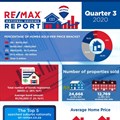Pent up demand for properties saw residential property sales skyrocket after the reopening of the property market during Level 3 lockdown in SA. According to ooba, this property market boom continued through the third quarter, fuelled by low interest rates and favourable lending terms from South African banks.
Says Rhys Dyer, CEO of ooba: “Interest rate cuts throughout 2020 contributed to a revival in the property market. The South African Reserve Bank cut interest rates five times this year, reducing the prime rate to 7%, the lowest level since 1966. This is the biggest margin in rates cut in decades as the Reserve Bank attempts to ease the financial and economic fallout from the coronavirus pandemic, particularly for individual households.”
He adds that buyers who previously could not afford a property are entering the market for the first time due to lower interest rates and lower transfer duties, particularly in the middle-priced segment.
Renters becoming property owners
“This trend is driving many renters to become property owners. This is evident in the average age of home loan applicants for Q3 of 2020. On average buyers are one year younger from 38 to 37 years of age, while the age of first-time buyers has dropped from 35 to 34 years compared to Q3 2019,” says Dyer.
Cheaper borrowing costs also enable homebuyers to purchase bigger and more expensive properties. This factor, coupled with demand for housing running ahead of stock supply in certain price categories, is evident in the increase in the average purchase price from R1,193,944 in Q3 of 2019 to R1,304,756 in Q3 2020, which equates to a 9.3% growth year-on-year. Over the same period, the average purchase Pprice for first-time buyers increased by 15% to reach R1,082,857. Anecdotal evidence shows that the growth in a segment of the economy who are working from home is also creating a demand for bigger homes, contributing towards this unexpected rise in the average purchase price.
“First-time buyers are streaming into the market, accounting for 54% of ooba’s mortgage bond applications processed in the third quarter, a 10% increase compared to the third quarter of 2019. During this period, ooba recorded a 50% increase on Q3 2019 in the volume of home loan applications processed, the highest level of volumes in 13 years,” says Dyer.
Trends toward lower or zero-deposit bonds
Statistics from ooba show an ongoing trend to lower or zero-deposit bonds. The demand for 100% bonds amongst ooba’s home loan applicants in Q3 2020 was up by 7% year-on-year compared to Q3 2019.
Dyer says: “Strong support from banks helped sustain the buoyant property market as they continue to lend with no or very low deposit requirements. The average deposit as a percentage of the purchase price fell by 25% year-on-year for Q3 to 8.6% This quarter, 63% of homebuyers purchased property without making a down-payment of which 82% were successful in obtaining finance, similar to ooba’s overall home loan approval rate in Q3 2020.”
Dyer remains optimistic about the future of the South African property market.
Demand expected to remain strong
“With little risk of interest rates rising until late into 2021 and banks continuing to make home loan finance accessible, we expect that the demand for housing will remain strong for the remainder of 2020. In addition, from a home loan perspective, this is a particularly appealing time to acquire property for the first time or upgrade to a more expensive property or buy a second property using cheaper finance,” says Dyer.
"The average interest rate offered by banks to successful home loan applicants in Q3 2020 has increased by 0.09% year-on-year. This is a result of the cost of funding for banks increasing. Now more than ever, it is essential to use the services of a home loan comparison service such as ooba to shop around for the most competitive home loan from the major lenders,” concludes Dyer.






























